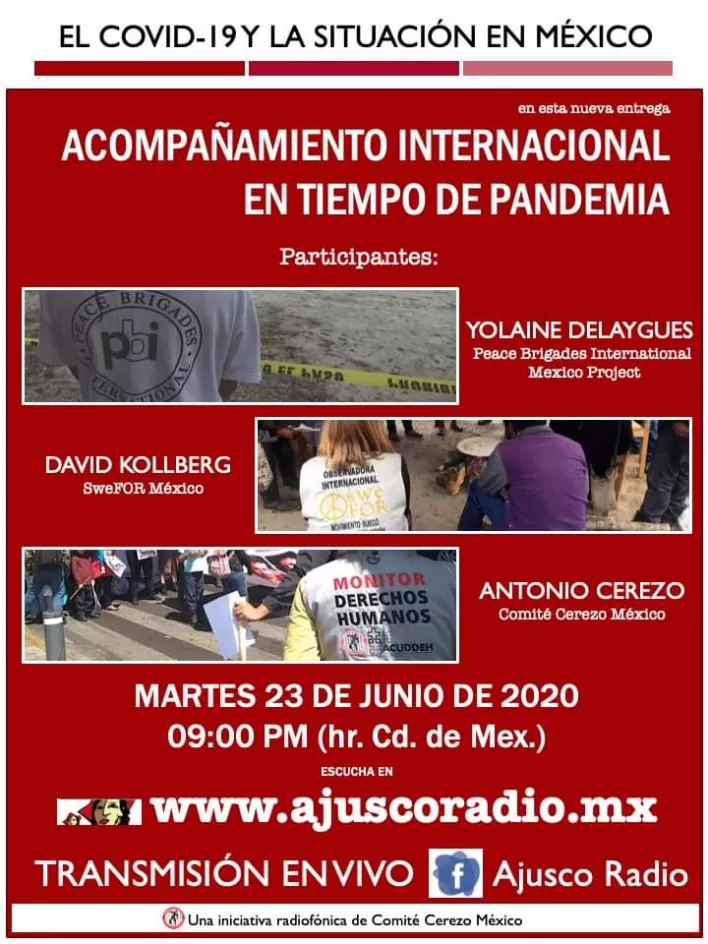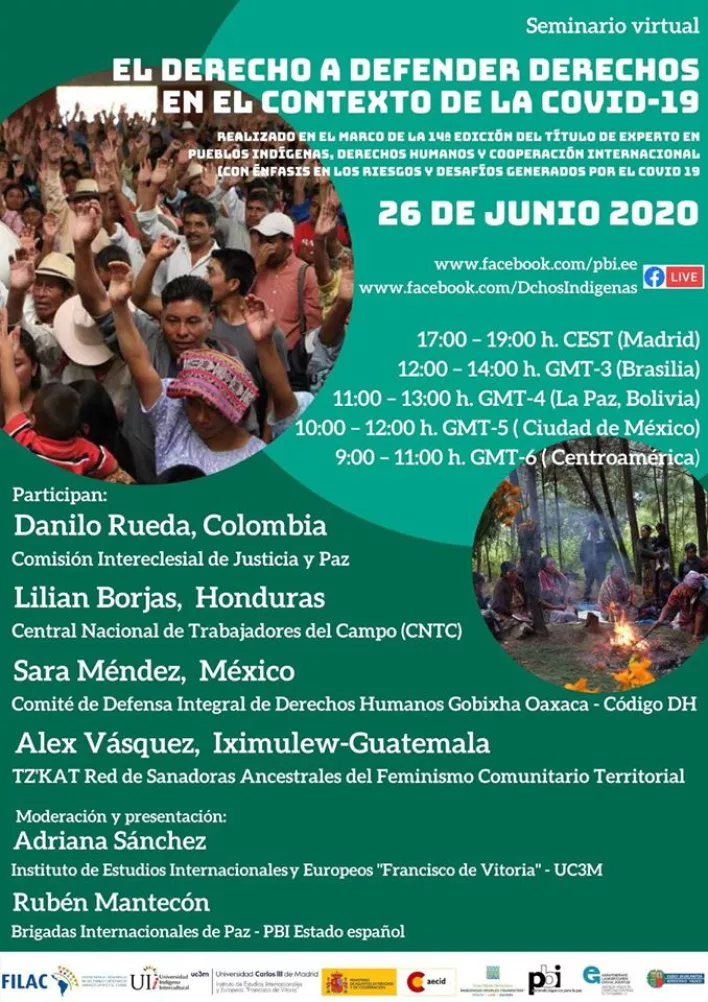During this past month we participated in and carried out various activities as part of our current remote accompaniment of organizations and human rights defenders in Mexico. Here, we highlight some of them:
Regional Webinar “Facing the context of COVID 19”
On June 12, PBI’s projects in the region organized an online activity with accompanied defenders, in order to exchange information about the context in different countries and to talk about ways in which the pandemic is being faced by the organizations. Defenders from Honduras, Mexico, Colombia, Nicaragua and Guatemala discussed the different impacts that COVID-19 has had in the political, social, economic and cultural spheres, as well as common trends at the regional level. At the same time, different coping tools were shared, implemented in this context by some of the participants, both individually and collectively. Human rights defenders agreed that the pandemic has magnified the serious human rights situation in the countries of the region, and now more than ever the strengthening of networking at the national and international levels is essential.
This space sought to reinforce the ties that PBI projects in the region have been strengthening since 2018, as a result of activities financed by the Dutch Ministry of Foreign Affairs in the framework of the Latin American Regional Project. This is the first discussion in a series of meetings that we plan to continue replicating with diverse groups of human rights defenders accompanied by PBI projects in Mexico, Honduras, Colombia, Nicaragua / Costa Rica and Guatemala.
Radio Program “COVID and the situation in Mexico, International Accompaniment in a time of pandemic.”

On June 23 we were invited by the Comité Cerezo México to participate in the radio program “COVID and the situation in Mexico”, in its edition on International Accompaniment in a Time of Pandemic. Moderated by Francisco Cerezo, it included the participation of David Kollberg from the organization SweFOR México1 as well as the participation of Antonio Cerezo, from the Comité Cerezo México.
The objective of the program was to visibilize the long history shared with the Comité Cerezo México and the work of international accompaniment, particularly in the context of PBI’s 20-year presence in Mexico.
After presenting an overview of international accompaniment, we recalled that we first arrived in the late 1990s at the request of Mexican civil society organizations after the Zapatista uprising2. Due to the high risks that the then newly created Comité Cerezo faced in 2002, including death threats, we began to accompany them3. We highlighted our perspective on the current risks faced by human rights defenders, regretting that our presence is still necessary after 20 years in the country, as was underlined by Antonio during the broadcast.
Finally, we confirmed that despite the adverse conditions in which we find ourselves due to the current global pandemic, we continue to carry out accompaniment remotely, maintaining contact with the organizations that we accompany as well as Mexican authorities and representatives of the international community.
You can listen to the entire program at the following link (Spanish only): https://www.facebook.com/ajuscoradio.mx.pueblosantotomas/videos/966911810401403
Webinar “The right to defend rights in the context of Covid-19”4

From Mexico, Sara Méndez, Coordinator of the organization Código DH, participated. Código DH is an organization accompanied by PBI Mexico since its creation in 2011.
Sara highlighted that “in Mexico, as in many Latin American countries, justice is a luxury”, referring to the high levels of impunity that persist in the country despite the struggles for justice. She added that in a scenario like the current one, where social distancing and the request to stay home as a consequence of Covid-19 are inserted into social dynamics, denouncing the violation of a right is almost impossible. Sara explained several challenges that indigenous communities face, including defending their rights to health and access to water. Mendez noted that “water is a good that is being privatized in many communities and indigenous peoples of Mexico. Meeting the health recommendations is almost impossible due to the lack of access to distribution systems or the shortage of drinking water”.
The participating defenders spoke about the progress and challenges that human rights defenders face in this context, especially those who defend their land and territories. They agreed that this group of people have been exponentially affected as a result of the health emergency, which has represented a huge challenge given the contexts of violence, poverty and marginalization that many communities maintain.
To see the full webinar again, click here.
1 https://www.facebook.com/sweformexico/?refpage_internal
2 https://pbi-mexico.org/es/sobre-nosotros/pbi-m%C3%A9xico/historia-del-proyecto
